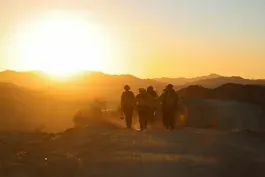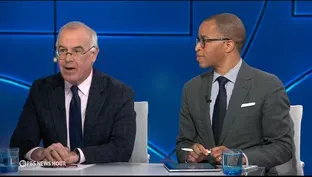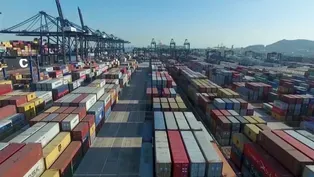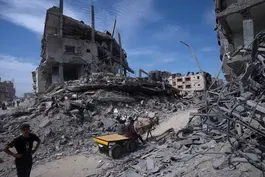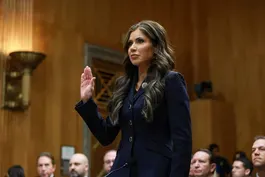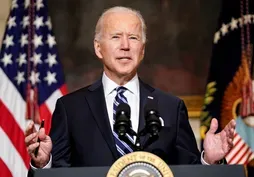
Gazans desperate for aid but hopeful worst is behind them
Clip: 1/17/2025 | 7m 10sVideo has Closed Captions
Gazans desperate for aid but hopeful ceasefire means the worst is behind them
Israel's security cabinet approved the ceasefire and prisoner exchange deal with Hamas after Prime Minister Netanyahu signed off on the agreement. The deal goes into effect Sunday local time. Nick Schifrin reports and speaks with Sigrid Kaag, the United Nations coordinator for humanitarian relief who's just been appointed envoy for Mideast peace.
Major corporate funding for the PBS News Hour is provided by BDO, BNSF, Consumer Cellular, American Cruise Lines, and Raymond James. Funding for the PBS NewsHour Weekend is provided by...

Gazans desperate for aid but hopeful worst is behind them
Clip: 1/17/2025 | 7m 10sVideo has Closed Captions
Israel's security cabinet approved the ceasefire and prisoner exchange deal with Hamas after Prime Minister Netanyahu signed off on the agreement. The deal goes into effect Sunday local time. Nick Schifrin reports and speaks with Sigrid Kaag, the United Nations coordinator for humanitarian relief who's just been appointed envoy for Mideast peace.
How to Watch PBS News Hour
PBS News Hour is available to stream on pbs.org and the free PBS App, available on iPhone, Apple TV, Android TV, Android smartphones, Amazon Fire TV, Amazon Fire Tablet, Roku, Samsung Smart TV, and Vizio.
Providing Support for PBS.org
Learn Moreabout PBS online sponsorshipAMNA NAWAZ: Welcome to the "News Hour."
After 15 months of war, the guns over Gaza are scheduled to go silent in just over 24 hours.
That's after the Israeli government approved the ceasefire deal, a short time ago.
GOEFF BENNETT: According to that deal, the war will stop for at least 6 weeks, and Israeli hostages, as well as Palestinian detainees, will be released.
In a moment, Nick Schifrin speaks with the United Nations coordinator for humanitarian relief who's just been appointed "envoy for Middle East peace," but he starts with this report on the tense hours before the fighting is expected to stop.
NICK SCHIFRIN: Tonight in Gaza, one of Israel's final strikes, as Prime Minister Benjamin Netanyahu and the Cabinet debate the cease-fire expected to begin on Sunday.
Culture Minister Miki Zohar: MIKI ZOHAR, Israeli Culture and Sport Minister: We hope that, in the future, we will be able to finish the job in Gaza.
This is something that we want to do, but now we want to bring our people back home.
NICK SCHIFRIN: Gazans who today are still grieving their dead, still desperate for food, know the war could resume after the six-week cease-fire.
But there is cautious hope these scenes, this deprivation will soon be past.
TAMAM ABU WARDA, Displaced Palestinian (through translator): When they said there would be a truce, we were so happy we couldn't sleep all night and all day.
We're exhausted from our exhaustion.
Our youth is gone.
Our lives are gone.
Our world is gone.
JOE BIDEN, President of the United States: You can't take out two, 10, 12, 1,500 people.
NICK SCHIFRIN: Last night on MSNBC, President Biden said he pushed Netanyahu to be restrained in Gaza.
JOE BIDEN: I said, you can't be a carpet-bombing in these communities."
And he said to me: "Well, you did it.
You carpet-bombed" -- not his exact words, "But you carpet-bombed Berlin.
You dropped a nuclear weapon.
You killed thousands of innocent people, because you had to in order to win a war."
I said: "But that's why we came up with the U.N." NICK SCHIFRIN: And it is the U.N. planning to surge humanitarian trucks into Gaza starting Sunday.
Joining me now is Sigrid Kaag, who just today was named U.N. special coordinator for the Middle East peace process, adding that portfolio to her other job, the U.N. senior humanitarian and reconstruction coordinator for Gaza.
Sigrid Kaag, thanks very much.
Welcome back to the "News Hour."
Congratulations on the new job.
You enter this peace process job with a transformed region, Iran and its proxies on its back foot, a new U.S. president who's close to the Israeli government and the Arab world's willingness to normalize with Israel if Israel takes steps toward a Palestinian state.
So do you see this as a moment of opportunity for the peace process?
SIGRID KAAG, U.N. Senior Humanitarian and Reconstruction Coordinator for Gaza: Well, I think we have gone through a deep crisis in the region, and this is indeed a moment of potential opportunity.
We all need to seize the moment, starting, of course, with the crisis in Gaza, securing successful implementation of the cease-fire, but looking at the horizon, which is the safe and secure Israel, alongside the establishment of a viable independent Palestinian state.
NICK SCHIFRIN: The current Israeli government has resisted the two-state solution, and some of its members are talking about annexation in the West Bank.
Where does that leave the peace process?
SIGRID KAAG: It's meant when the prospects of the realization of a two-state solution even further out of sight.
But coming back to your opening question, are we at a historical moment, potentially with new opportunities, I would say yes, but it depends on many factors, and, above all, political will and leadership, to see this through.
NICK SCHIFRIN: The cease-fire that has been agreed upon by the Israeli Cabinet today, which allows for a humanitarian surge into Gaza, is the U.N. ready, and are there conditions in Gaza that will allow for that humanitarian surge to arrive?
SIGRID KAAG: The U.N. is as ready as it can be.
Obviously, there's a lot of work ahead of us.
Conditions in Gaza are appalling.
It will be very hard to deliver aid as we would like to.
We don't have a mechanism on law and order because we don't have clarity on what the governance will be for and in Gaza.
In recent months it's been extremely difficult to work, not just because of the fighting that goes on, but also the criminality and looting that takes place.
That doesn't disappear overnight.
So we have to work in very insecure conditions.
I don't expect that it will see miracles on day one in Gaza.
But, as a collective effort, everybody is working to prepare to make sure we try as best as possible.
NICK SCHIFRIN: Today, can you describe the scale of the scarcity in Gaza?
SIGRID KAAG: Nowadays, one is surprised if you see children wearing shoes in Gaza.
There's no winter clothes.
There's no shelter.
It's ramshackle, at best.
Adults go by with one meal a day max, and mostly it's not a hot meal.
Mothers save food from their mouth, literally, to give it to their children.
Children spend their days rummaging through garbage belts, looking for anything that could be tradable.
But to imagine a Gaza where the population was well-educated, children thrived and were always hoping for better.
All that is gone physically and mentally.
And you can see that in the destruction of the facilities, normal, basic human requirements.
That's the challenge.
NICK SCHIFRIN: In addition to the massive surge of humanitarian aid, a senior administration official says the deal calls for efforts to clear rubble and rehabilitate hospitals and bakeries.
How will that work?
SIGRID KAAG: That's a tremendous task ahead, regardless of how that works.
We need to clear rubble.
The equipment needs to get in.
The staff needs to be vetted.
People need to be able to work.
Same for the rehabilitation of not only hospitals, but I would say health points across the Gaza Strip.
Hundreds of organizations are active and willing.
They depend on the approved import of the goods they need to do the job.
Then it's a matter of time, assets, technical support and money.
NICK SCHIFRIN: Beyond what we have been talking about, phase three of the cease-fire agreement calls for the long-term reconstruction of Gaza.
And the scope there is absolutely overwhelming, as we even saw just today with new before-and-after satellite photos released above Gaza, two-thirds of all structures destroyed.
Do you believe that Gaza can be rebuilt?
SIGRID KAAG: I think it's our collective responsibility.
We were not able to stop the war.
Children need to go to school.
They need to be learning.
Pregnant mothers need to be seen by doctors.
They need to be giving birth in decent conditions.
And the story goes on.
And in the 21st century, I believe we can do it if we want to.
And I think we owe that.
We owe that both to Israeli citizens and we owe it to the Palestinians.
NICK SCHIFRIN: Sigrid Kaag, thank you very much.
SIGRID KAAG: Thank you.
Amanda Gorman pens tribute to crews battling LA wildfires
Video has Closed Captions
Poet Amanda Gorman pens tribute to crews battling the Los Angeles wildfires (4m 30s)
Brooks and Capehart on Biden's legacy, Trump's expectations
Video has Closed Captions
Brooks and Capehart on Biden's legacy and what to expect from Trump's 2nd term (10m 3s)
How businesses are preparing for Trump's tariffs
Video has Closed Captions
How businesses are preparing for the tariffs Trump has promised to impose (9m 22s)
McGurk breaks down complex negotiations to reach ceasefire
Video has Closed Captions
Brett McGurk breaks down complex negotiations to reach Israel-Hamas ceasefire (6m 56s)
News Wrap: Noem questioned about Trump's immigration policy
Video has Closed Captions
News Wrap: Noem faces questions about Trump's immigration policies (7m 54s)
Supreme Court clears way to ban TikTok in the U.S.
Video has Closed Captions
Biden White House says enforcement of TikTok ban will fall to Trump (5m 52s)
Providing Support for PBS.org
Learn Moreabout PBS online sponsorshipMajor corporate funding for the PBS News Hour is provided by BDO, BNSF, Consumer Cellular, American Cruise Lines, and Raymond James. Funding for the PBS NewsHour Weekend is provided by...

